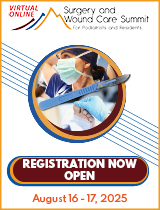|
|
|

|
Search
08/07/2025 Rod Tomczak, DPM, MD, EdD
Trade School vs. Medical School (H. David Gottlieb, DPM)
Just a short note to correct Dr. Gottlieb and his
erroneous conception of what Caribbean medical
schools are and their standards. Caribbean schools
are not driven by academic institutions that offer
an MD degree once tuition is paid. There is no
wink-wink, slap on the back and transfer of cash
under the table to get an MD degree. A student
goes to classes for two years and then sits for
step 1 USMLE boards. Even podiatry school uses
that format. In order to sit for USMLE step 1 a
DPM graduate would have to repeat the first two
years of medical school or the school could
forfeit accreditation which allows Caribbean
students to sit for USMLE, all parts. I don’t know
how many times it has to be repeated but just
because some DPMs think our basic science
curriculum is equal to an MD curriculum, doesn’t
make it so. The Caribbean schools must publish
statistics concerning their pass rates for
students taking Step 1 who attend the first two
years of classes in the Caribbean.
Caribbean students must perform well on Step
1practice tests before they are allowed to sit for
USMLE. This is a safeguard put in place by the
owners of the Caribbean school. Hence, Caribbean
schools can advertise a 95% pass rate on step 1.
If there are 100 students in the Caribbean class,
maybe 50 a certified to take the exam after a high
score on a practice test. Let’s say 45 out of the
50 pass. That is a 95% pass rate on step 1. The
other 50 students who didn’t take the test keep
taking practice exams or repeat the first two
years until they are likely to pass step 1.
After passing step 1, Caribbean students face
approximately 90 weeks of clinical rotations most
likely in the US. Low pass rates jeopardize the
Caribbean school’s accreditation. No student can
start clinical rotations without taking the first
two years at the Caribbean school and passing Step
1. These clinical rotations are real rotations all
around the United States. There is no university
hospital where a Caribbean student can spend the
entire years 3 and 4. It’s month by month. One in
Chicago, then a month in Mobile, AL then a month
in Tuna Fish, WY at community hospitals and often
in a FMG’s private office. There may be 10 other
Caribbean students in the office at the same time.
Preceptors are paid well to have a Caribbean
student in their office.
Driving all around the country is the norm. It's
impossible for Caribbean students to rotate
through US university hospitals because AAMC does
not want to dilute US med school students’
experiences with 10 foreign students on an IM
rotation and 3 American med school students.
Watching two deliveries does not constitute an
OB/GYN rotation, but spending a month in a private
psych hospital may pass for a psych rotation. All
core rotations, 48 weeks for year 3 and
technically 44 or so weeks for year 4 are the same
for Caribbean students as US medical school
students. There are no phone calls to St. Martiin
and “arrangements” made, Dr Gottlieb.
I don’t have the time or inclination to get into
post graduate training at this time, but it will
take work and compromises to get it done. Who pays
the residents? But the big problem will be board
certification. Our podiatrist wannabe with a DO or
MD has to complete a residency to get licensed and
certified. If graduates only have a DO degree, who
will issue board certification. ABFAS can not
certify a DO, and DOs don’t have this podiatric
hybrid certification. Without extensive thought it
will be Armageddon. The orthopedic foot surgeons
will be ecstatic. All our work will go for nought
when no DO foot surgeon will be certified or able
to get hospital privileges because they are not
board certified. Podiatry needs yet another board
certifying organization.
Rod Tomczak, DPM, MD, EdD, Columbus, OH
There are no more messages in this thread.
|
| |

|
|







